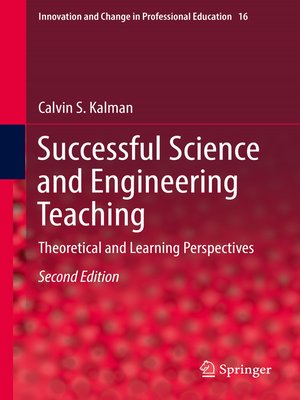Successful Science and Engineering Teaching
ebook ∣ Theoretical and Learning Perspectives · Innovation and Change in Professional Education
By Calvin S. Kalman

Sign up to save your library
With an OverDrive account, you can save your favorite libraries for at-a-glance information about availability. Find out more about OverDrive accounts.
Find this title in Libby, the library reading app by OverDrive.



Search for a digital library with this title
Title found at these libraries:
| Library Name | Distance |
|---|---|
| Loading... |
This second edition goes beyond the question of whether or not a pedagogical technique is effective, towards more of a focus on answering the question of why a particular technique or class of techniques is effective. In particular it is shown that students' epistemological beliefs could become more expert-like with a combination of appropriate instructional activities. The debate in the science education community between those who believe that students come in to the classroom with a theory about the subject which is different from that described by the teacher and their textbooks and those who feel that students' knowledge consists of isolated structures is elaborated especially in the light of the work by M.J. Lattery. Discussion of the stages in epistemic development in students beginning with the Perry model and continuing through later developments is now included. In this edition there is a discussion of how an instructor can enable the student to resolve cognitive dissonance in the difficulties students have in transcending their misconceptions. The second edition includes research comparing Peer Instruction with the Conceptual Conflict Collaborative Group Activity that had been described in the first edition. Much better instructions are available for students on how to use Reflective Writing including a rubric that simplifies the marking of Reflective Writing.







